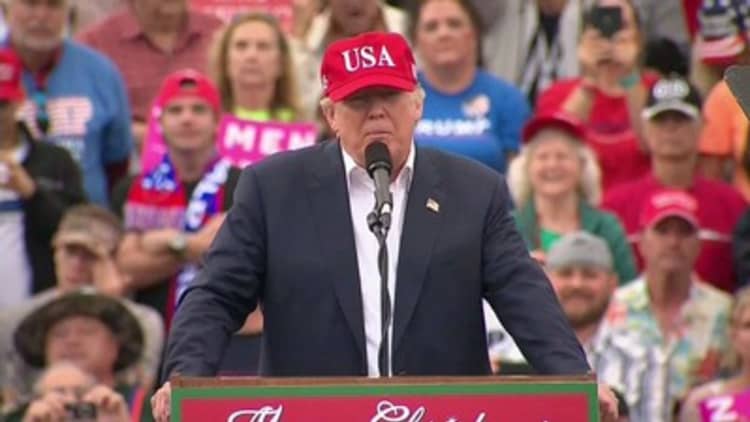
The Senate health-care bill has sharpened the central political question surrounding the 2017 Republican agenda: Will the voters who made Donald Trump president rebel?
Like the House health-care bill, the Senate version would roll back Obamacare's expansion of insurance coverage under Medicaid. While cutting Obamacare's taxes on the rich, it would shrink both subsidies and requirements on insurers for coverage on exchange marketplaces, leaving many beneficiaries with skimpier protection and higher deductibles.
Those changes threaten financial hardship for the very constituency that won Trump the 2016 Republican nomination and tipped the electoral votes that put him in the White House.
They violate his explicit pledges to protect Medicaid from cuts and reduce their out of pocket expenses for health care.
Yet that doesn't mean those voters will lash out if Congress enacts the cuts and Trump signs them. As an in-depth recent examination of the president's supporters shows, they backed him for different reasons.
A broad-based group of analysts conducted the study with support from the Democracy Fund. Emily Ekins of the libertarian Cato Institute identified five distinct groups of Trump voters.
Most of them are consistent Republicans. The least loyal Republican group, which formed the core of Trump's support for the nomination from the beginning, is what Ekins calls "American Preservationists."
She described this segment – about 20 percent of Trump backers overall – as having relatively low levels of income and formal education. They are the most likely Republican group to be on Medicaid and to be disabled.
These voters lean left on economic issues such as trade, income inequality, anger at Wall Street and support for federal entitlement programs. For those reasons, Trump's rhetoric about protecting entitlement programs and raising taxes on the rich offered a natural fit.
But so did Trump's tough stance on immigration and harsh words for Mexicans crossing the border. Overwhelmingly white like other Trump voters, "American Preservationists" also hold distinctive views on race.
They "have a strong sense of their own racial identity … and believe that anti-white discrimination is as pervasive as other forms of discrimination," Ekins wrote. "They have cooler feelings toward minorities. They agree in overwhelming numbers that real Americans need to have been born in America, or have lived here most of their lives, and be Christian."
And the study found that those views of racial solidarity helped propel Trump's general election victory more than his "populism" on trade or entitlements.
"What stands out most," concluded George Washington University political scientist John Sides, "is the attitudes that became more strongly related to the vote in 2016: attitudes about immigration, feelings toward black people and feelings toward Muslims."
As president, Trump has reflected their attitudes through a series of actions. His administration has toughened immigration enforcement, pursued his travel ban targeted at six majority-Muslim nations, and targeted Obama administration initiatives designed to change law enforcement and sentencing practices.
Though five months of controversy have eroded the president's public standing, polls show Trump retains backing from roughly 8 in 10 Republicans. What's unclear now is whether a direct hit from health-care legislation could trigger accelerated fallout among his base of white working-class support.
In the swing states Trump carried, those voters gained health insurance coverage in large numbers from Obamacare. They included 376,000 whites without college degrees in Ohio, 355,000 in Michigan, and 242,000 in Pennsylvania, according to an Urban Institute analysis.
Trump states such as Kentucky (279,000), Arkansas (128,000) West Virginia (119,000), also reduced the proportion of noncollege whites without health insurance by 47 percent or more. All have Republican senators who have wavered on the legislation.
Yet few doubt that Trump will sign whatever health bill House and Senate Republicans agree on — and count on his ability to hold his core supporters. The same is true of forthcoming tax-reform legislation, which from all available indications will confer disproportionate benefits on the wealthiest Americans.
"I'm not sure they will punish him," said Sides. The economy is currently healthy, insurance cutbacks will take years to phase in, and Trump's emotional bond with those voters has been strong.
Republican House members and some senators, however, must face voters in 2018, two years before Trump does. An economic downturn could upset their calculus.
Their relationship with Trump voters is also different than Trump's. Next week's planned Senate vote will test whether they share his confidence.
WATCH: Police forcibly remove disabled protesters from Capitol Hill



